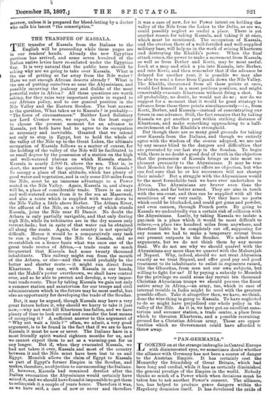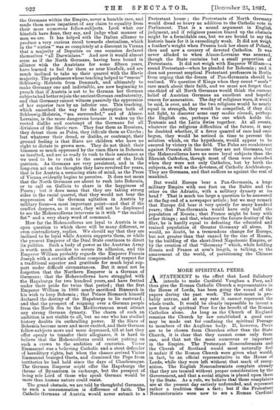" PAN-GERMANIA." L OOKING on at the strange imbroglio in Central
Europe with disinterested eyes, we sometimes doubt whether the alliance with Germany has not been a source of danger to the Austrian Empire. It has certainly cost the Monarchy the friendship of Great Britain, which had been long and cordial, while it has as certainly diminished the general prestige of the Empire in the world. Nobody thinks so much of a Power which when decisions must be taken has to ask another Power's consent. The alliance, too, has helped to produce grave dangers within the Hapsburg dominion itself. It has developed the pride of the Germans within the Empire, never a humble race, and made them more impatient of any claim to equality from their more numerous fellow-subjects. Look what our kinsfolk have done, they say, and judge what manner of 'men we are. It has helped with the Italian alliance to produce a very curious recoil towards clericalism, which in the " sixties " was so completely at a discount in Vienna that a majority of Deputies on one occasion declared themselves "all Darwinians." And now it would almost seem as if the North Germans, having been bound in alliance with the Austrians for some fifteen years. have learned to feel for them as near kinsfolk, and are much inclined to take up their quarrel with the Slavic majority. The professors whose teaching helped to "rescue" Schleswig - Holstein from Denmark, and ultimately to make Germany one and indivisible, are now beginning to preach that if Austria is not to be German her German subjects had better rejoin the ancient German confraternity, and that Germany cannot witness passively the oppression of her superior race by an inferior one. This teaching, which smoothed the way for the absorption both of Schleswig-Holstein, "sea surrounded," and of Alsace- Lorraine, is the more dangerous because it wakes up the rooted dislike and contempt of the Germans for all -divisions of the Slavic race. They fear them as Russians, they detest them as Poles, they ridicule them as Czechs ; but whatever their dread, or dislike, or contempt, their ground feeling is that Slays are children who have no Tight to dictate to grown men. They do not think their kinsmen so much oppressed by the risen Slays in Bohemia as insulted, and are as ready to rush to their assistance as we used to be to rush to the assistance of the Irish garrison. As Germans are very persistent, and in the long-run act on the thoughts they have revolved for years, that is for Austria a menacing state of mind, as the Press of Vienna evidently begins to perceive. It does not mean that the North Germans are about to rush into Bohemia, or to call on Gallicia to share in the happiness of Posen ; but it does mean that they are taking strong sides in the racial quarrel, that they would not bear the suppression of the German agitation in Austria by military force—a most important point—and that if the conflict deepens, as it must, they will not be displeased to see the Hohenzollerns intervene in it with " the mailed fist" and a very sharp word of command.
How far the Hohenzollerns are loyal to Austria is an open question to which there will be many different, or even contradictory, replies. We should say that they are inclined to be loyal while Austria supports them, or while the present Emperor of the Dual State continues to direct its politics. Such a body of power as the Austrian Army is worth much sacrifice to secure its adhesion, and the Emperor William probably regards the Emperor Francis Joseph with a certain affection compounded of respect for a traditional superior and gratitude for much loyal sup- port under difficult circumstances. But it must not be forgotten that the Northern Emperor is a German of Germans; that the Hohenzollerns have struggled with the Hapsburgs for two hundred years, and have fretted under their pride for twice that period ; that the first Emperor William in 1866 nearly sacrificed Bismarck in his wish to keep Bohemia ; that Prince Bismarck himself declared the destiny of the Hapsburgs to lie eastward ; and that the prospect of reigning over a German people from the North Sea to the Mediterranean must attract any strong German dynasty. The charm of such an ambition is not visible to all, but no one who has studied history doubts its enthralling power. If the Slays of Bohemia become more and more excited, and their German fellow-subjects more and more depressed, till at last they offer openly to transfer their allegiance, it is hard to believe that the Hohenzollerns could resist putting on such a crown to the ambition of centuries. Victor Emmanuel was a believing Catholic and a stout defender of hereditary rights, but when the chance arrived Victor Emmanuel besieged Gaeta, and dismissed the Pope from territories he had held since the days of Charlemagne. The German Emperor might offer the Hapsburgs the throne of Byzantium in exchange, but the prospect of being sole Lord of those who speak German would be more than human nature could resist.
The grand obstacle, we are told by thoughtful Germans, to such a consummation is difference of faith. The Catholic Germans of Austria would never submit to a Protestant house ; the Protestants or North Germany would dread so heavy an addition to the Catholic vote in Parliament. That is a sound argument in English judgment, and if religious passion blazed up the obstacle might be a formidable one, but we are bound to say the historic basis for it is exceedingly weak. It did not weigh a feather's weight when Prussia took her share of Poland, then and now a country of devoted Catholics. It was never alluded to when Alsace-Lorraine was annexed, though the State contains but a small proportion of Protestants. It did not weigh with Emperor William—a sound Protestant—when he pleaded for Bohemia ; and it does not prevent sceptical Protestant professors in Berlin from urging that the dream of Pan-Germania should be realised. We question if Kings when they count " souls" care much about their faith, and we must not forget that one-third of all North Germans would think the current belief of Austrian Germans an excellent and hopeful reason for annexation. The day of religious wars, it would be said, is over, and as the two religions would be nearly equal in strength, they would be compelled, if they did not fight, to discover some easy modus vivendi, perhaps. the English one, perhaps the one which holds the Teutonic and the Latin Swiss together. At all events, whatever the religious difficulties of the future, it may be doubted whether, if a fierce quarrel of race had once begun, they would be noticed in time to prevent the solution which, on the hypothesis, would appear to be assured by victory in the field. The Poles are recalcitrant against Prussia still because they are not Germans, but the Hohenzollerns have no more loyal subjects than the Rhenish Catholics, though most of them were absorbed when they were not only Catholics, but by birth the subjects, as well as the devotees, of Catholic Archbishops. They are Germans, and that suffices as against the rest of mankind.
But would Europe bear a Pan-Germania, a huge military Empire with one foot on the Baltic and the other on the Adriatic, with a military dynasty at its head ? That is much too large a question to be answered at the fag-end of a newspaper article ; but we may remark that Europe did bear it very quietly for many hundred years • that Pan-Germania would have only half the population of Russia ; that France might be busy with other things • and that, whatever the future destiny of the Slav, he is hardly equal to defeating the educated and trained population of Greater Germany all alone. It would, no doubt, be a tremendous change for Europe, but not greater than that caused by the rise of Russia, by the building of the short-lived Napoleonic Empire, or by the creation of that "Germany " which, while holding Russia and France at arm's length, is talking, to the amazement of the world, of partitioning the Chinese Empire.



































 Previous page
Previous page